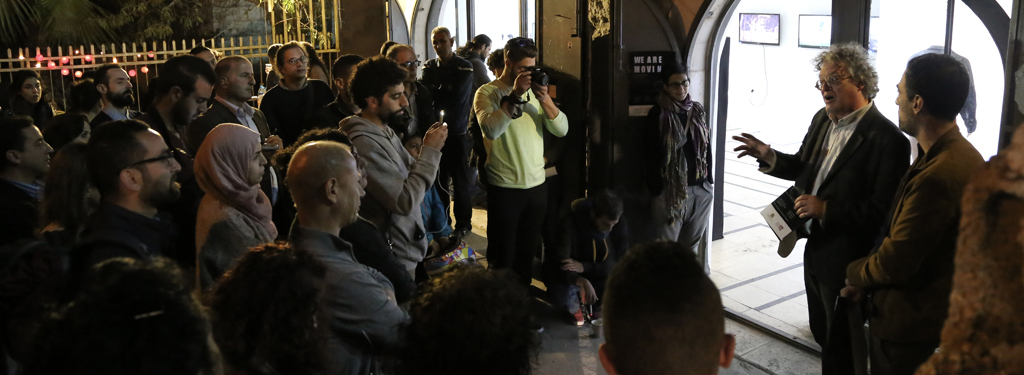Collectives Programme
To create local communities that are capable of change and self-reliance, adopt an untraditional approach to engaging with community issues and with inherited stereotypical ideas in society, the PP formed eight interdisciplinary collectives with various structures. These have a stance of opposition to the ideas of tradition and professionalism in the current Palestinian cultural milieu.
Wednesdays at Sakakini
Wednesdays at Sakakini is a joint collaborative residency programme between the PP and Khalil Sakakini Cultural Centre. Extending from early 2016 towards the end of 2017, the Wednesdays at Sakakini collective includes Basta Theatre, Hakaya and Talfit for Arts and Culture. It is an investigational process based on how to make art and culture useful, and make sense in the place, by avoiding typical one-offs. The resident collective shall dismantle and break down knowledge to a communicative level with the public. Events organised by Wednesdays at Sakakini included a series of lectures and film screenings: a lecture by Collective 28 (4 December); a workshop with artist Shuruq Harb (21 December); a screening of They Live, a film by John Carpenter (28 December) a screening of The Battle of Algiers, a film by Gillo Pontecorvo (14 December); Implications of Visual Culture in the City, a lecture by Yazid Anani (7 December); and a visit to the village of Talfit for field research (29 December). At the end of March 2017, Wednesdays at Sakakini also organised an event, illustrating its experiment and research outcomes.
ékleipsis
The PP initiated the idea of creating the ékleipsis collective to highlight group work in artistic forms. It involved an adaptation of two theatrical plays: A’tma and Victory Over the Sun. In partnership with curator Lara Khaldi and in collaboration with playwright Dia Barghouti, ékleipsis comprised 10 students of art, theatre and music. The collective participated in an interdisciplinary workshop to develop ideas and design the final performance (20-24 and 27-28 December). The workshop brought together Samar Haddad King (dance designer), Dalia Taha (playwright), Reem Shilleh (curator), Dina Shillah (musician), Rania Jawad (academic writer), and Jumana Abboud (artist). A pilot performance, Draft ékleipsis, was premiered on 1 April 2017.
LARP
Established in Palestine in 2011, LARP is open to youths of multiple backgrounds to study and play the roles of characters, sometimes through improvisations, and sometimes through controls. In the context of its collaboration with the AMQF, LARP organised workshops with artist Jumana Abboud to produce artworks on 21 and 28 January, 18 and 25 February, and 8, 15, 18 and 25 March. Workshops were also held with Mohammed Rabah on 4 and 11 March to design the artist’s biography and characters of the exhibition opening. An open call was published for Daydream Silhouettes, presented by a Palestinian-Syrian artist (an invented character constructed and produced in a workshop). In the first exhibition, the artist documents his journey from Syria and Lebanon to Europe away from the war in the homeland. The exhibition was themed around an inquiry into survival, non-survival, displacement, exile and art. Following the exhibition, on 13 May 2017, a seminar was held about the performance, which resulted from the exhibition. The seminar brought together by Khaled Hourani, Samar Martha, Yazid Anani, Mahmoud Abu Hashhash, and actors from LARP. The conversation highlighted dimensions and consequences of this performance as part of self-inquiry within the art scene.
Everyday Dance in Everyday Spaces
To deepen the dialogue between local performers and the public, participants in Everyday Dance in Everyday Spaces (EDES), overseen by curator Samar Haddad King, will design performances that are deduced from the everyday bodily movements inspired from the streets. EDES is a series of performances in public spaces intended through interventions in the city. It aims to expand the scope of joint artwork between dancers and other cultural practitioners. EDES involves a series of workshops, lectures, discussions and feedback. Consultants from a variety of cultural fields are hosted to enable a multidisciplinary approach in designing and realising each of the projects. The project takes place between March 2017 and November 2017. Artists’ projects will be presented in this project.
Coffee in Gaza
Between 26 February and 23 March, the collective Coffee in Gaza conducted a field survey and interviews and produced a film on 25 coffee shops in Gaza. This project investigated the notion of the political sphere in Gaza through surveying the material culture of the diverse coffee shops that spreads across all segments and neighbourhoods of the city. Moreover, the project aimed at recording everyday conversations with coffee shops regulars while sipping their coffee and smoking their cigarettes. The collected data was designated to probe the transitory meaning of the public and social spheres in the cantonised Gaza Strip between its former Israeli colonial conditions through the current Hamas governance.
A significant portion of the PP activity relies on networking with active organisations and individuals in culture and education fields. The PP also participated in various workshops, made presentations and delivered lectures both locally and internationally, and built networks with AMQF visitors on several occasions. Through participation in the Qalandiya Encounters Programme, the PP had a discussion with curator Nat Muller to diagnose a group of international and local artists and curators, who could present interventions and film screenings in this programme. These were Üvel Oğlu, Reem Shilleh, Sven Augustijnen, Samar Martha, Ayesha Hameed, Marcel Schwerin, and Majed Abdul Hamed. The PP coordinated travels and residencies of the speakers.

